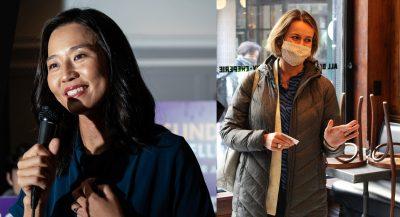
Michelle Wu and Annissa Essaibi George surfaced as the top two candidates of Tuesday’s preliminary election, setting the stage for a historic general election that would give Boston its first elected female Mayor and first elected person of color.
The final votes came in at 9:53 a.m. Wednesday, with Wu at 33.36% and Essaibi George at 22.48%.
Both candidates gave speeches hinting victory well before Boston’s Elections Department—which struggled to report beyond 1 percent of votes — announced significant tallies. Their wins were accompanied by concessions from candidates such as Acting Mayor Kim Janey, who was running for a full term.
“This was a spirited and historic race, and I wish them both luck in the final election,” Janey said in a statement. “While tonight hasn’t ended how we hoped, we have so much to be proud of.”
Janey was the first woman and first person of color to be seated in the Mayor’s chair after her predecessor, Marty Walsh, departed for his position as Secretary of Labor in the Biden Administration. Rachael Cobb, associate professor and chair of political science and legal studies at Suffolk University, said Janey’s loss could reflect her late entrance to the race.
“She’s not an incumbent the way many incumbents are, so it’s hard to compare,” Cobb said. “But, at the same time, the incumbents have not lost in Boston, so this is surprising.”
Associate Professor in the political science department at University of Massachusetts-Lowell John Cluverius said the election was Michelle Wu’s “race to lose.”
“Michelle Wu was the top citywide vote-getter,” Cluverius said. “She also has the best name recognition, according to the polls.”
Data from the Boston Election Department indicates 108,180 ballots were cast in this preliminary race.
“This is a low turnout election, not a lot of people were paying attention, and the people that are paying attention see Michelle Wu as a winner,” Cluverius said, “and people like voting for winners.”
Approaching midnight Tuesday night, election staff were still processing thousands of mail-in and ballot box votes, according to Alexis Tkachuk, member of the Boston Election Commission. As for whether a similar timeline would occur in November, Tkachuk said “that’s open to discussion.”
“Obviously, mail-in ballots is something that the electorate and elected officials want to support, as well as the ballot boxes, particularly during COVID,” Tkachuk said, “So potentially, yes.”
Until then, the candidates might not share similar strategies on the final leg of campaigning, according to Cluverius. For instance, Essaibi George could have the incentive for more debates, contrary to Wu, who may want fewer to retain her lead.
“When you are placed in second, without an obvious coalition to come behind you, you have to make strategic choices that always can backfire,” Cluverius said about Essaibi George’s position in the race.
Coming in second by a 10.88% margin means Essaibi George will have to properly balance the right political equation to surpass her fellow lawmaker in the polls, Cluverius said.
“She has to play smart and get lucky in order to win,” Cluverius said. “Michelle Wu does not have the same set of requirements.”
Though one campaign will start with less public support, Cobb said both will operate strategically to target a specific demographic of known voters rather than seeking to persuade unregistered or unlikely voters.
“Their goal here is, how many votes do we need to win,” Cobb said. “They are thinking very, very, very strategically about who they know they’ve got, and then who they’ve got to persuade, and they are less interested in finding the unlikely voters.”
Boston’s Ward 4 Democratic Committee endorsed Wu last May, and its Chair, Jonathan Cohn, said he was “very excited” to see her win by such a large margin.
“Something that was clear in polling about young voters in Boston being strongly in favor of Michelle [Wu] was clearly reflected in the election results,” Cohn said.
Cohn also characterized what he believes separates the two candidates.
“Essaibi George is mainly focused on a continuity from Walsh,” Cohn said. “[Wu] understands the interconnections between the city’s issues and about how we could craft policy to make sure that we’re addressing them at the same time.”
But no matter who takes the City’s top job, her administration will create a “substantial transformation” in terms of how Boston is governed, Paul Watanabe, director of the Institute for Asian American Studies at UMass Boston, said.
“I think of Boston as often referred to as ‘the Athens of America,’” Watanabe said. “Like Athens, Boston has always been led by White men.”
Wu, daughter of Taiwanese immigrants, and Essaibi George, of Tunisian and Polish immigrants, will need to “build a broader coalition” of supporters in the next two months to get them the vote.
“It’s going to take some challenge to appeal broadly across people from different races,” Watanabe said.












































































































